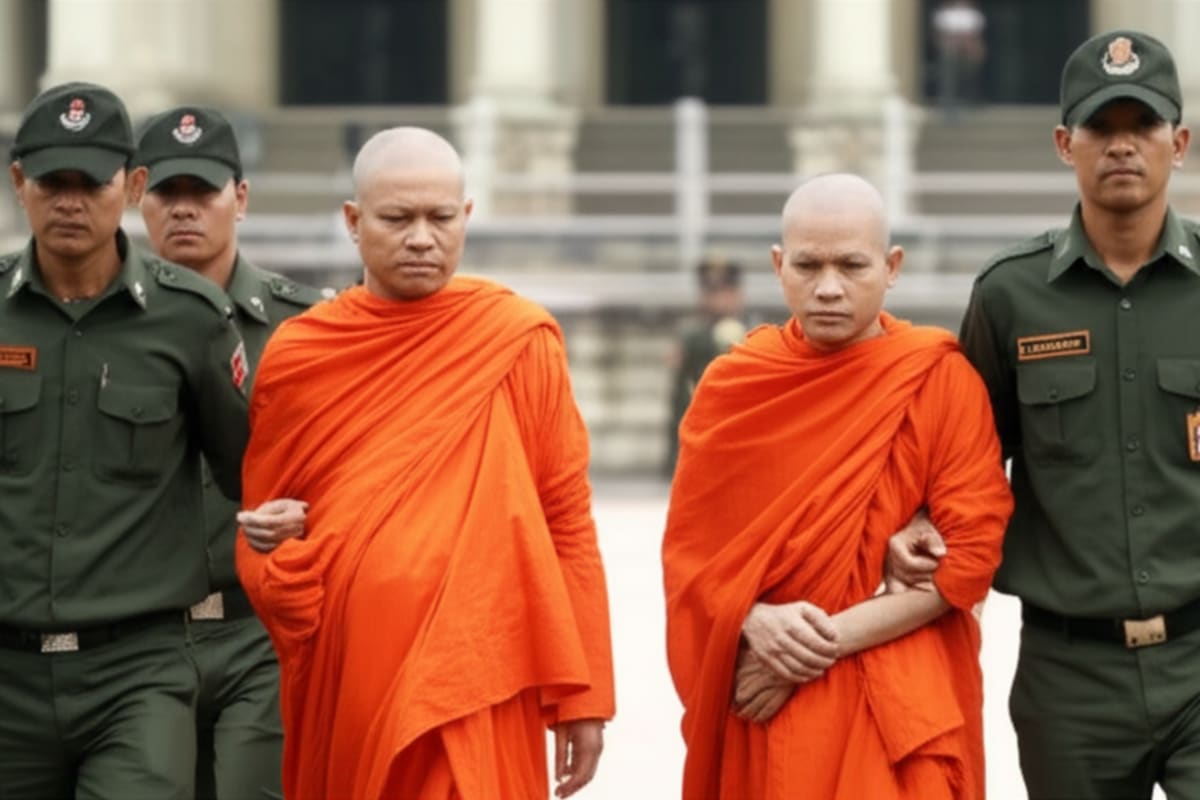Cambodian Monks Detained: National Security Concerns

The detention of two Cambodian monks on September 2nd, 2025, has sent ripples of concern throughout the country and drawn international attention.
Background
The monks were apprehended following the discovery of what authorities have vaguely described as "suspicious evidence" related to national security and military matters A brief report in the Khmer Times sparked immediate speculation and unease, highlighting the delicate balance between religious institutions, national security imperatives, and potential political undercurrents within Cambodia The government's reluctance to provide specific details about the alleged evidence has only intensified public anxiety and fueled rumors Government Scrutiny and Cultural Sensitivity: A Tightrope Walk The Cambodian government, under Prime Minister Hun Sen's long-standing administration, is likely to face intense scrutiny for its handling of this sensitive case Known for its firm stance on national security, particularly in a region marked by political instability, the government must navigate a complex landscape of cultural and religious considerations The detention of revered religious figures, even under suspicion, carries significant cultural and political weight in Cambodia, a nation deeply rooted in Theravada Buddhism The roles these monks play within their respective communities, the potential impact of their absence on local religious practices, and the optics of potentially perceived persecution demand careful and nuanced handling Unanswered Questions: A Call for Transparency Several critical questions remain unanswered, leaving a void filled with speculation and mistrust What exactly constitutes the "suspicious evidence" that led to the monks' detention Was this evidence directly linked to any planned actions that threatened national security, or was it merely circumstantial and suggestive What legal processes will be followed during their detention and any potential trial Will they have access to legal representation and a fair hearing The lack of detailed information from the Cambodian authorities raises serious concerns about transparency, due process, and the potential for political motivations behind the arrests Broader Political and Security Context: A Region in Flux Understanding this incident requires situating it within the broader political and security context of Cambodia and the surrounding region Cambodia shares borders with Thailand, Laos, and Vietnam, nations facing their own internal conflicts and political challenges The long-standing border disputes with Thailand and concerns about Vietnamese influence contribute to the government's heightened sensitivity to national security Furthermore, historical instances of political and religious tensions within Cambodia, including the Khmer Rouge regime's brutal suppression of Buddhism, shape the public's interpretation of this event Any analysis must consider these interconnected factors Balancing Security and Religious Freedom: A Test of Governance This incident also shines a spotlight on the delicate balance between national security concerns and the fundamental right to religious freedom in Cambodia The government must ensure that any security measures implemented are proportionate, justified, and carried out fairly and within the bounds of the law, respecting the rights and freedoms of all citizens, including religious figures The international community, particularly human rights organizations and religious freedom advocates, will be monitoring the situation closely, paying particular attention to the observance of human rights, due process, and the treatment of the detained monks Potential Scenarios: Exploring the Possibilities Given the paucity of information regarding the alleged evidence, drawing definitive conclusions is impossible However, several potential scenarios can be considered: The monks may have inadvertently come into possession of sensitive materials without realizing their significance They might have been actively involved in activities perceived as detrimental to national security by the government, possibly unknowingly The evidence could be fabricated or misinterpreted, leading to wrongful accusations
The true nature of their alleged involvement is crucial for understanding the severity of the situation and its wider implications The Imperative of Transparency: Building Trust and Stability In the absence of concrete information, rumors and speculation will continue to proliferate
It is therefore essential for Cambodian authorities to provide timely, transparent, and credible updates on the investigation, while respecting the privacy and dignity of those involved The timing and manner in which information is released will significantly influence public opinion and either foster stability or fuel further unrest The international community's assessment will also be heavily influenced by the government's responsiveness and its commitment to due process Transparency and adherence to the rule of law are paramount for maintaining public trust and promoting stability within Cambodia Conclusion: Charting a Path Forward This case underscores the critical need for clear communication, unwavering adherence to due process, and a respectful balance between legitimate national security concerns and the fundamental rights of individuals, including religious leaders, within the complex Cambodian context The international community will undoubtedly continue to monitor developments closely, emphasizing the importance of transparency, human rights, and a fair and impartial judicial process The situation serves as a stark reminder of the intricate and often fraught relationship between religion, politics, and security in a region characterized by both profound cultural heritage and persistent political challenges The release of comprehensive and verifiable information from the Cambodian government is vital for dispelling uncertainty, mitigating potential unrest, and promoting understanding The incident's ramifications extend far beyond Cambodia's borders, highlighting broader global concerns about the delicate balance between national security and religious freedom Sustained international scrutiny will remain focused on ensuring a just and transparent resolution, while simultaneously respecting the cultural sensitivities of the region
